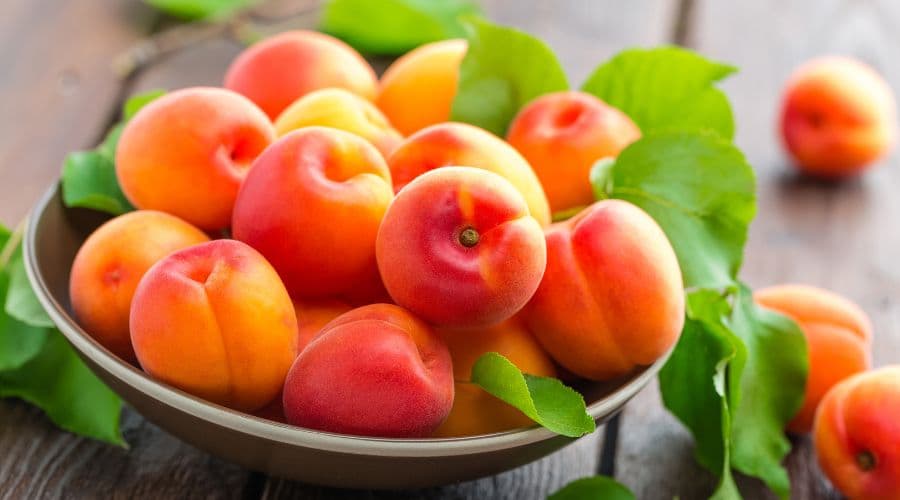Apricot Benefits: Why It Needs To Be A Part Of Your Daily Diet

Medically Reviewed By
Dr Divya Rohra
Written By Kirti Saxena
on Mar 8, 2024
Last Edit Made By Kirti Saxena
on Mar 17, 2024

The northern regions of India, like Himachal Pradesh, Uttarakhand, Jammy & Kashmir, and some Northeastern states, are known for their rich Apricot cultivation. It is the fruit of the summer. This fruit is both colorful and flavourful. It is also one of the most highly nutritious foods. Apricots are known for boosting gut health and improving skin conditions.
Apricot colors range from yellow to golden orange. Also known as Khubani in the northern regions of India, it consists of a single seed in the middle core, which also can be eaten. It’s enclosed with an outer shell, also called “stone.”
Besides the fact that it is one of the tastiest and juiciest fruits, it is also one of the most nutrient-dense as well. It helps treat indigestion, constipation, earaches, fever, skin diseases, cancers, and anemia. It also helps improve heart health and treat over-exerted muscles and wounds. Did you know that because of its skincare benefits, it is also used as an ingredient in various cosmetic products?
Let’s highlight the nutritional aspect of Apricots:
An 80g serving of apricots provides:
- 25Kcal / 107KJ
- 0.7g protein
- 0.1g fat
- 5.8g carbohydrate
- 5.8g sugars
- 1.8g fibre
- 216mg potassium
- 324mcg carotenes
- 5mg vitamin C
Why are Apricots good for you?
- Rich in protective plant compounds
- Supports vision and protects eyesight
- Beneficial for youthful skin
- Maintains digestive system
- It helps maintain gut health
- Improves the cardiovascular system
- Regulate high blood pressure
- Protects the liver
- It helps in fighting against certain cancer variants
- Alleviates menopausal symptoms
Let’s understand the benefits of Apricot in detail:
- Rich in plant-based compounds: Apricots are rich in active plant compounds like carotenoids, flavonoids, and phenols. These compounds act as a defense mechanism for the plant and act the same way for humans as well. They support our immune system and heart and protect us from certain forms of cancer.
- Protects your eyesight: The Apricot’s yellow and orange color indicates high carotenoid levels. Lutein (a particular version of Carotenoids found in Apricot) is a major source of Vitamin A. It protects our eyes, delays the onset of age-related macular degeneration, and supports cognitive function in the elderly.
- Supports skin health: Due to apricots being rich in carotenoids, they play a vital role in maintaining good skin health. They protect against aging effects due to environmental factors like UV radiation, pollution, and smoking. As per studies on the various types of carotenoids - phytoene and phytofluene, it was seen that a higher intake of such fruits improves skin radiance, suppleness, and elasticity.
- Helps maintain a good digestive system: Rich in dietary fiber, apricots support regular stomach transit and help fend off constipation. They also contain the sugar sorbitol, which, when taken in the form of fruits like plums, apricots, and peaches, is advised for the treatment of constipation.
- Supports gut health: As mentioned in the above points, Apricots are rich in fiber, plant-based chemicals, and sorbitol, which influence our gut mitochondria. Studies suggest that apricots promote good bacterial composition in the stomach that helps in maintaining good and stable gut health.
- Improves the cardiovascular system: Fruits are one of the best choices to protect your cardiovascular health. Due to being rich in protective plant compounds and antioxidants, apricots are known to work wonders in combating heart diseases. They also provide rich fiber content that lowers bad cholesterol called LDL (low-density lipoprotein) which has been linked to causing heart diseases.
- Regulate high blood pressure: Apricots have an abundant amount of potassium. It serves as an electrolyte in the body and controls fluid balance and muscle contractions when paired with sodium. Because of this, consuming enough potassium is crucial to avoiding bloating and preserving a healthy blood pressure level.
- Protects the liver: Numerous studies have revealed that eating a healthy amount of apricots helps shield the liver from damage. Because the fruit has a high vitamin content and antioxidants like carotenoids, it protects against the negative effects of toxins and alcohol.
- Helps in fighting against certain cancer variants: Apricot extracts have been shown to stop breast cancer cells from growing. It has also been found that it is highly recommended to treat pancreatic, lung, and colon cancer. However, larger clinical trials are nevertheless required to validate these effects in people.
- Alleviates menopausal symptoms: The phyto-oestrogenic compounds in Lignans which are found in dried apricots make them a powerful ingredient for managing menopausal symptoms in women. These elements also help in dealing with chronic diseases.
Including apricots in your daily diet can be very beneficial as it fills your body with essential nutrients for tackling various types of physical conditions. We hope you enjoyed reading the article and learning how apricot is a power-packed fruit. Enjoy fresh during the summer season, or dry during the winter months for continuous benefits.



